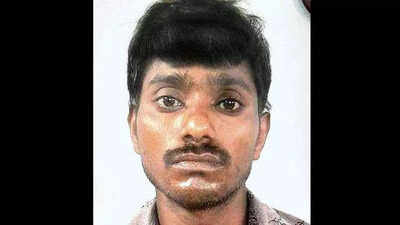- News
- City News
- surat News
- Surat: Man who raped four-year-old gets imprisonment for life
Surat: Man who raped four-year-old gets imprisonment for life
Surat: Man who raped four-year-old gets imprisonment for life

Ajay alias Hanuman Nishad Kevat
SURAT: In a rare fastest judgment, a special court for Protection of Children from Sexual Offences (POCSO) Act convicted a 39-year-old for raping a four-year-old girl, on Thursday.
Convict, Ajay alias Hanuman Nishad Kevat, was sentenced to imprisonment till last breath and fined Rs one lakh. Compensation of Rs one lakh was announced for the rape survivor.
The minor, daughter of a migrant worker, was raped on October 12 in Sachin GIDC area and police arrested Nishad a day after he perpetrated the crime. Police had filed chargsheet within 10 days of the crime and the trial was completed within six days.
Nishad, father of three children, abandoned the minor in bushes after brutalising her. Drenched in heavy rain, she was shivering when found.
The court examined the evidence between October 26 to October 29. After vacation, the court resumed on November 10 and on Thursday, the judgement was announced.
“The court took cognizance of the severity of the crime and continued hearing till October 29 midnight. Principal district judge VK Vyas and POCSO court judge PS Kala ensured that the judgement is announced at the earliest,” said Nayan Sukhadwala, district government pleader, Surat.
“This is the fastest ever judgment in such a heinous case in the country,” Sukhadwala claimed.
Along with arresting the accused, collection of scientific and medical evidence and recording statements of the concerned persons, police ensured that the forensic investigation was completed in the shortest possible time. Senior police officials including city police police commissioner Ajay Tomar requested top officials of the directorate of forensic science in Gandhinagar to provide early results of various reports.
Police got gait analysis and forensic reports of various samples within a short period.
“Our team worked hard to ensure that we set an example to prevent such incidents. This is probably the fastest judgement in rape of minor in the country and we will take up each such case on priority,” said Tomar.
(The victim's identity has not been revealed to protect her privacy as per Supreme Court directives on cases related to sexual assault)
Convict, Ajay alias Hanuman Nishad Kevat, was sentenced to imprisonment till last breath and fined Rs one lakh. Compensation of Rs one lakh was announced for the rape survivor.
The minor, daughter of a migrant worker, was raped on October 12 in Sachin GIDC area and police arrested Nishad a day after he perpetrated the crime. Police had filed chargsheet within 10 days of the crime and the trial was completed within six days.
Nishad, father of three children, abandoned the minor in bushes after brutalising her. Drenched in heavy rain, she was shivering when found.
The court examined the evidence between October 26 to October 29. After vacation, the court resumed on November 10 and on Thursday, the judgement was announced.
“The court took cognizance of the severity of the crime and continued hearing till October 29 midnight. Principal district judge VK Vyas and POCSO court judge PS Kala ensured that the judgement is announced at the earliest,” said Nayan Sukhadwala, district government pleader, Surat.
“This is the fastest ever judgment in such a heinous case in the country,” Sukhadwala claimed.
Along with arresting the accused, collection of scientific and medical evidence and recording statements of the concerned persons, police ensured that the forensic investigation was completed in the shortest possible time. Senior police officials including city police police commissioner Ajay Tomar requested top officials of the directorate of forensic science in Gandhinagar to provide early results of various reports.
Police got gait analysis and forensic reports of various samples within a short period.
“Our team worked hard to ensure that we set an example to prevent such incidents. This is probably the fastest judgement in rape of minor in the country and we will take up each such case on priority,” said Tomar.
(The victim's identity has not been revealed to protect her privacy as per Supreme Court directives on cases related to sexual assault)
FacebookTwitterLinkedinEMail
Start a Conversation
end of article
Quick Links
Delhi Air PollutionDelhi TemperatureChennai WeatherBangalore TemperatureCovid vaccination centres in DelhiCoronavirus in DelhiRTPCR test in GurgaonHyderabad RainPollution level in BangaloreDelhi SmogDelhi TemperatureNoida AQIGurgaon AQI todayFire in MumbaiMumbai RainsCovid 19 RT PCR Test in NoidaDelhi AQI todaySrinagar encounter

